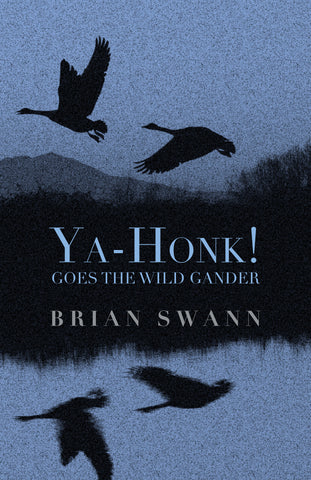Ya-Honk! by Brian Swann
or, Covid Divagations
It’s an amazing book. These prose meditations circle, engage, even deflect the looming presence and isolations of the Covid year. Swann’s “emergent occasions” are vividly described city streets, domestic moments, dreams recalled or proposed and wonderfully angular, brief narratives. In their digressive qualities they recall Defoe’s Journal, not as source but as precedent. Covid left us all with varied emptiness and arbitrary time. Swann offers us his effort to fill in the blanks.
—Michael Anania
In Ya Honk! Goes the Wild Gander, or Covid Divagations, Brian Swann chronicles the Covid-19 pandemic as dystopian sci-fi literature, capturing the uncertainty and fear through direct experience—“No one knows what’s coming and even if a cure arrives there may be no one left to save”—as well as detached observation—neighbors decamping to second homes, packages stacked before front doors that are built against strangers and loved ones alike, TV images of piling up corpses. And then, as can happen, when the daily trappings of life are stemmed and a community is ordered to shelter in place, the writer extracts resources from his files—memory, imagination. In the fertile, isolated mind, in the storehouse of recall and creativity, the vignettes arise. Astute and conversational, Swann’s fragments swirl swiftly from encounter to concept, from ordinary moment to momentary insight.
—Martine Bellen.
In Ya Honk! Goes the Wild Gander, or Covid Divagations, Brian Swann tells us the Iroquois term “ononharoin” is the ceremony in which the brain is turned upside-down, where you can only riddle to get what you want. His prose poems and fictions circle real-time memories with the less-than-fabulous covid present to recreate the mysteries of one “who captures the blue in the prism all around” and “the noise the emptiness makes.” The narrator finds maggots under the floormats in “The Other Side,” a man “who strangles balloons into sausages” in “The Contortionist,” and a penknife that animates a desk in “Ducks.” Each piece is a kind of riddle, plunging into life and where they emerge is always a surprise.
—Terese Svoboda
Publisher: Madhat, Inc.
Language: English
ISBN-13: 978-1-952335-71-6






